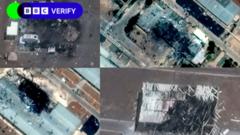Israel conducted a significant strike against Iranian nuclear sites, killing high-ranking military officials and raising alarms about potential retaliation and the escalation of conflict in the region, with both nations poised for further military engagement.
Regional Tensions Escalate Following Israeli Strikes on Iran's Nuclear Facilities

Regional Tensions Escalate Following Israeli Strikes on Iran's Nuclear Facilities
Major military actions unfold as Israel targets Iran's nuclear program, leading to fears of widespread conflict.
In a dramatic surge of military confrontation, Israel initiated a comprehensive assault on Iran’s nuclear installations early on June 13, 2025, targeting key military figures including the commander of the Islamic Revolutionary Guard Corps, Gen. Hossein Salami. This pre-emptive strike is described by Israeli officials as a vital move to inhibit Iran's progress toward atomic weaponization, amid mounting regional tensions.
Eyewitness accounts from Tehran reported a series of powerful explosions throughout the city, with Iranian state media broadcasting images of considerable destruction and billowing smoke clouds. Israeli military operations focused primarily on military bases, nuclear enrichment facilities in Natanz, and the residential homes of senior Iranian officials. Reports indicate the deaths of several pivotal figures, including Maj. Gen. Mohammad Bagheri, intensifying fears of a deeper military engagement.
In response to the strikes, Iranian leaders vowed retaliatory actions. Gen. Shekarchi, the spokesperson for Iran’s Armed Forces, insisted that counterstrikes would follow, underlining a heightened state of military readiness. Despite the risks, Israel framed these operations as essential for its national security, asserting the need to thwart Iran’s nuclear ambitions.
Public shelters across Israel were filled as citizens braced for potential fallout from Iranian retaliation, with the Israeli government imposing a state of emergency and urging the population to remain alert. Prime Minister Benjamin Netanyahu emphasized the attack as a necessary act against "an existential threat," echoing historical fears that a nuclear Iran poses a significant risk to Israel.
The situation remains fluid, with the broader implications of this military action prompting concerns from global leaders about the possibility of escalating conflicts in the Middle East. As both nations prepare for a potential military escalation, the international community watches closely, worrying about the risks posed to regional stability and civilian safety.






















